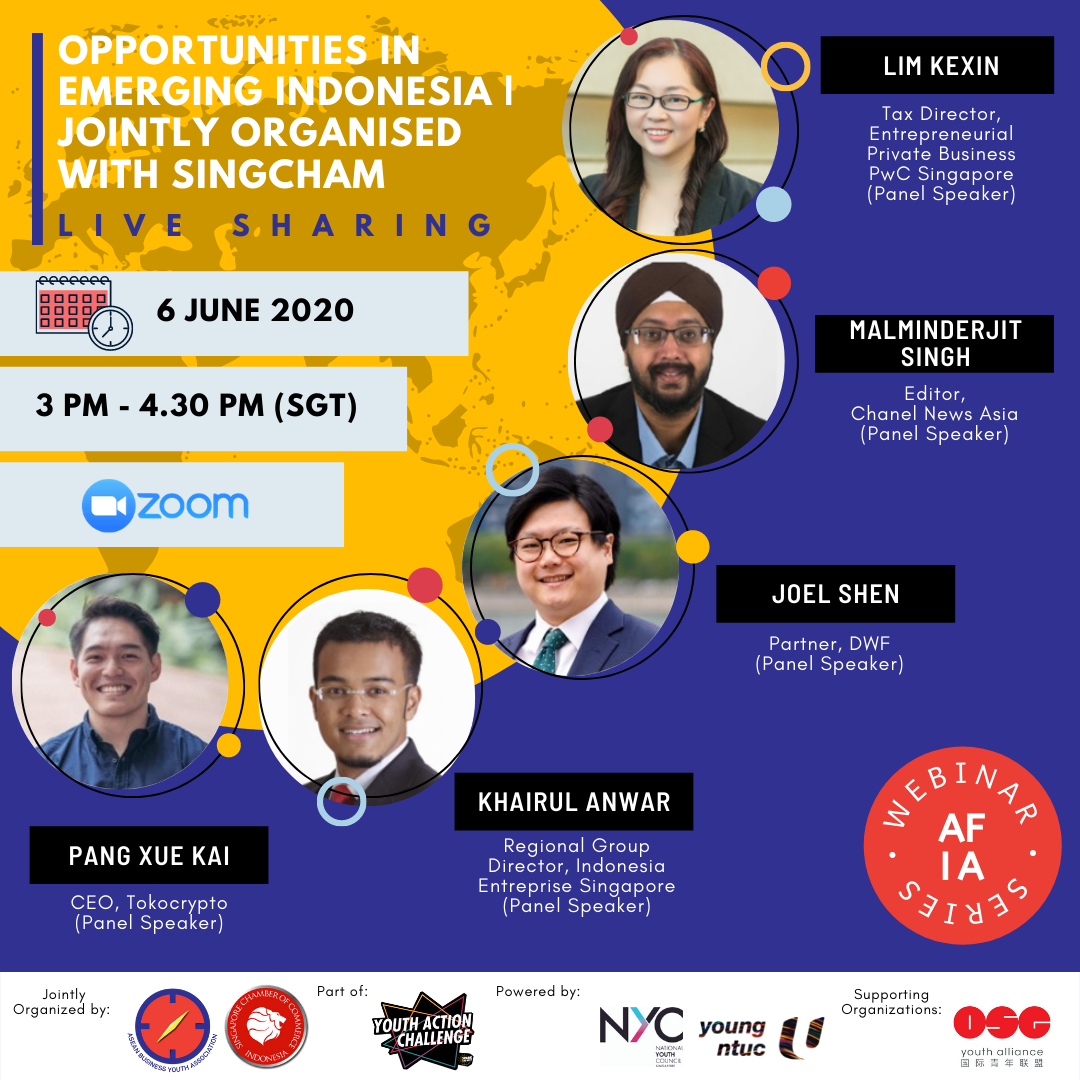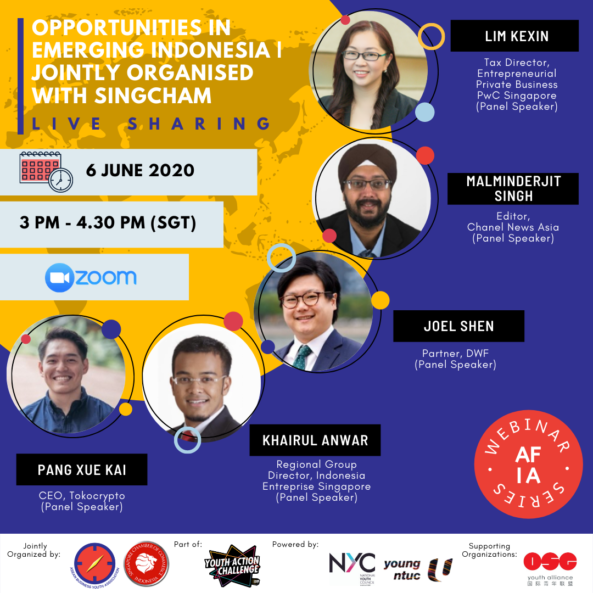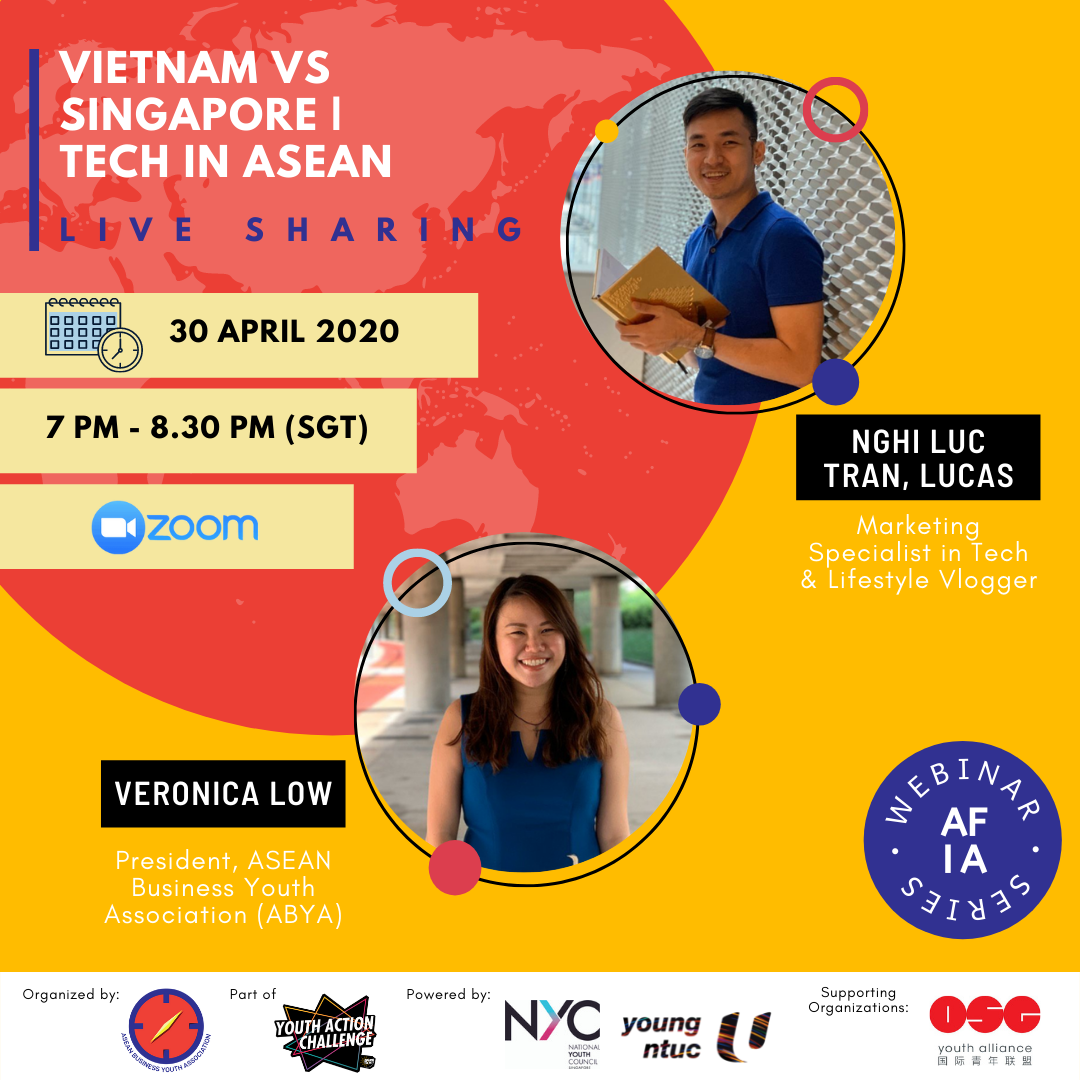
Together with Singapore Chamber of Commerce Indonesia (SingCham), ASEAN Business Youth Association (ABYA) was honoured to host a stellar line-up of four panel speakers, namely Khairul Anwar, Regional Group Director (Indonesia) of Enterprise Singapore, Lim Kexin, Tax Director of PwC Singapore, Joel Shen, Venture Principal and Partner of DWF and Pang Xue Kai, CEO of Tokocrypto. The moderator of this session, ABYA’s second A Future in ASEAN webinar, was Malminderjit Singh, editor at Channel NewsAsia.
Written by: Soon Poh Suan
Edited by: Isabelle Goh
With the on-going COVID-19 global pandemic, the webinar took place via Zoom and ABYA was glad to host over 150 eager participants on the evening of 6th June 2020. ABYA would like to thank its supporting organisation, Singapore Global Network, for providing ABYA with the necessary digital tools.
Market Expectations
Starting from a macro perspective of Indonesia, the panel speakers shared personal realisations towards the emerging market. Khairul shared his understanding of Indonesia’s market situation, making it apparent that Indonesia was managing its economy adeptly prior to COVID-19 but it remains too early to ascertain the long-term impact of the pandemic on its growth trajectory. The young and growing population is fueling rising consumption across sectors, and Khairul encouraged Singaporeans to go beyond the resources sector to plug into emerging business opportunities in logistics, e-commerce, Fintech and other tech startups.
As a mergers and acquisitions (M&A) lawyer, Joel shared that it does not seem that interest has waned across Indonesia. He commended the population’s strong interest displayed towards the various industries, especially the technology sector — Financial Technology (Fintech), Advertising Technology (Adtech), Health Technology (Healthtech) and e-payment initiatives. Joel remains positive about Indonesia’s technology industry because this emerging trend may likely be able to fill in the gaps of traditional businesses. Xue Kai added that there are great opportunities in industries such as healthcare, gaming, infrastructure and transport.
Perspectives in Finding New Opportunity
Indonesia’s ‘Unity in Diversity’ national motto reminds us that the country can be viewed in multiple layers, to which Kexin added that we may also find ‘simplicity in complexity’. A culturally vibrant culture such as Indonesia’s ought to be seen for its opportunities, amidst the apparent difficulty which organisations may face prior to investing time and effort to learn about the economy and way of life.
While Indonesia is set on the right trajectory, Khairul mentioned that there are still ongoing business inefficiencies that provide an opportunity to identify pain points and propose solutions. One such opportunity is in infrastructure and transportation of goods, given the fragmentation of many cities that exist within a single country. Startups are also poised to bloom in such an environment with tremendous opportunity — to which Xue Kai fondly recalled to be the reason, in why he had made the choice to start-up in Indonesia. He has continued to reside in Indonesia since late 2017, having founded Tokocrypto, the first cryptocurrency exchange platform to be approved by the Indonesian Commodities and Derivatives Supervisory Board.
Dynamic Interplay of Businesses
Unique to Indonesia’s market is the existence of many large family businesses, alongside the many micro-businesses. It was expressed that the two types of businesses value-add to business environments.
The interaction between these two types of businesses was described by Kexin to be similar to Yin and Yang, a multi dimensional evolution of the Indonesia environment can be seen as complementary and evolving. Whilst operating at an “intersection that could benefit both in their businesses”, these two players need not be seen as two ends of the business spectrum. Instead, there are joint opportunities for investment and integration, rather than being mutually exclusive.
Joel believes that we are now living in a world where technology is greatly valued by people, thus enabling more tech-enabled businesses in e-commerce, travel agencies, and payment initiatives where large banks partner with prominent payment companies.
Business Culture
Familiar to many is Indonesia’s road scene, which may often leave the outsider in awe with how drivers are able to maneuver their way through the seemingly nonlinear system of traffic. This was used as an analogy, by Kexin, to describe how there are not always lines that can be seen, yet implicit behaviours and cultural codes guide the traffic and other interactions in Indonesia.
Kexin gave her advice to aspirants looking to venture into Indonesia — to accept that the country’s situation may not always be as it appears to be, at first glance. Instead, one should expect the unexpected, whilst appreciating the fundamentals and cultural nuances to best steer one’s organisation and career in the sometimes fluid environment.
The differences in the ways of doing business between Singapore and Indonesia, was also exemplified by Khairul. It does seem that work culture in Singapore places a higher emphasis on task-orientation and adherence to Standard-Operating-Procedures (SOPs). On the other hand, the work culture in Indonesia requires more time invested in human connections to facilitate healthy business relationships. The speakers had also shared about their personal realisations, that it is important to “know who, to know how” to complete a work task, in Indonesia’s business setting.
Venturing into Indonesia
Popular locations to set up in Indonesia include Jakarta, Batam and Bali. While these are undoubtedly business hubs, Khairul encourages one to also consider the other areas of the archipelago of 17,000 islands. There are many areas of opportunities for the Singaporeans’ pursuit of careers elsewhere, such as real estate, financial services, e-commerce, manufacturing, farming, hospitality and transportation.
A key point of interest from the youth audience was also in identifying the ideal age and duration that one should plan for their overseas career, in a market such as Indonesia. Xue Kai had thus impressed upon the audience that “there is no right time”. The decision to set up a business, the execution of it and the connections established are dependent on one’s maturity, that may not necessarily tie with age. It was instead expressed that one should be committed to spending at least three years in-market, to get a deep sense of the cultural intricacies and business dealings. Joel had also noted that should one decide to do so, he or she would need to embrace the unknown with open-mindedness and a sense of adventure. This is especially given that the work opportunities would not be traditionally familiar with what is available in Singapore.
Emerging Trends
Due to the COVID-19 global pandemic, the movement of capital has been put on hold. When asked about other emerging trends, Khairul mentioned that geographically, Jakarta remains the most cosmopolitan landscape. However, he strongly advised aspiring entrepreneurs to adopt “Jakarta Plus One” approach, which refers to venturing into Jakarta and one other city to expose one’s self to opportunities in other emerging cities. For example, Surabaya, the second largest city of Indonesia, presents opportunities of a slightly different flavour than Jakarta, however also introduces different business opportunities. Joel elaborated that there are other places showing positive business trends as well, such as Bali, Malang and Bandung — especially in the technology sector to ensure better quality of life.
Seeing a Future in ASEAN
On a final note, the panel had recalled their experiences and reasons which kept them invested in building their careers in Indonesia. It was shared by Joel, that the reasons to which expatriates stay or leave may be quite apparent, given that the initial impressions of traffic and pollution may deter one from further pursuing this opportunity. However, other aspirants who choose to look past such immediate circumstances may instead appreciate Indonesia for its culturally rich landscape and tremendous economic growth opportunity. Emphasising on personal development, Khairul also mentioned that gaining experience in this key Southeast Asian market at some point in your career would enrich your skills portfolio and be a good way of differentiating oneself from other professionals in the same trade.
ABYA would like to thank the panel for the personal and professional sharing on the factors that have guided their careers in Indonesia, as they see a future in ASEAN. With these insights, ABYA will continue to establish connections between ASEAN and Singaporean youths, whilst constantly seeding information influence to nurture ASEAN-savvy youths.




